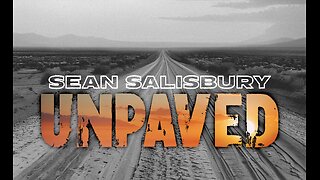Premium Only Content

1 Very Good Reason Vegan Milk Beats Cow Milk
Being dairy-free is a natural and healthy choice. All the nutrients in milk are easily found in plant-based foods that will make you thrive and you won’t miss a thing! Many of us have been brought up with the idea that we need milk for calcium but it’s nothing more than a successful ploy by the dairy industry. They provide ‘educational’ materials to schools, lobby the Government, organize lectures for healthcare professionals, sponsor research and pay millions for advertising to condition people to think they ‘need’ milk. Yet no one needs milk after weaning and no one needs the milk of another species. There’s nothing in cow’s milk that you can’t find in plants, just minus all the bad fats, hormones and gluey protein.
Calcium Question
Calcium is an important mineral that we need for healthy bones, muscle function, numerous metabolic reactions and hormonal balance - about 700 mg per day (adults), children a bit less, adolescents and lactating women slightly more. And we can get more than enough from non-dairy sources as long as we eat a varied and reasonably healthy diet.
The National Osteoporosis Society agree:
“If you don’t eat dairy products, you will need to include lots of other calcium-rich foods such as green leafy vegetables, almonds, sesame seeds, dried fruit, pulses, fortified soya drinks and soya protein (tofu) in your diet. A vegetarian diet is not a risk factor for osteoporosis and vegetarians and vegans do not appear to have poorer bone health than the rest of the population.”
Get your calcium from:
Nuts and seeds: almonds, Brazil nuts, sesame seeds and tahini (sesame seed paste used in many recipes)
Pulses: peas, beans, lentils, soya and calcium-set tofu
Green leafy vegetables: broccoli, kale, spring greens, cabbage, watercress, parsley
Dried fruit: figs, apricots
Fortified products: plant milks (soya, almond, oat, hemp, rice, coconut), soya yogurts
Healthy Bones
Our bones need good nutrition and a healthy lifestyle to be strong and healthy. Milk is not just unnecessary for healthy bones - studies show that high intakes can even increase the risk of bone fracture!
Calcium is important to bones health and easy to get from the foods listed above. Another nutrient crucial to maintaining healthy bones is vitamin D. It’s produced in your skin when exposed to the sun in the summer but during the winter months (or if you always protect your skin from sunlight), you might need to take a supplement regardless of your diet (this advice applies to everyone in the UK).
However, we need much more than calcium and vitamin D to produce strong bones. Nutrients such as potassium, magnesium, selenium, zinc, copper, boron, iron, vitamin K, vitamin C, B group, beta carotene (vitamin A) are also necessary but don’t panic! Fruit and vegetables, nuts and seeds, pulses and wholegrains are the best sources.
One last thing - bone adapts to the weight and pressure applied to it and it needs this stimulation to stay strong. There’s no need to sweat your socks off but moderate, weight-bearing exercise is a must. This means walking, carrying shopping bags, dancing, gardening, ball games, jogging, yoga, weight-lifting exercise and so on.
Protein Fiction
Some people believe that dairy products are a good source of protein. It’s true that milk contains some protein but it’s certainly not good for us! One type of protein found in milk – casein – is notoriously hard to digest and it’s so tough that it can be used to make furniture glue. Scientists also discovered that it encourages prostate cancer growth! And other milk proteins – whey proteins – are no miracle either. Whey protein powders have been repeatedly linked to acne.
Milk protein can also cause milk allergy and intestinal bleeding in babies – it’s the most common cause of infant anaemia.
Dairy’s ‘dirty secret’: it's still cheaper to kill male calves than to rear them - Early disposal is known as the ‘dirty secret’ by farmers, and none relish it. But keeping the calf to sell on to be raised for beef or veal means the farmer will have to rear them for two to four weeks to a good enough weight to interest buyers, at a typical cost of around £2 a day, with selling prices at market as low as £25-40. This doesn’t include extra costs such as getting the calf to market, registering its birth or veterinary bills.
In contrast, shooting the calf costs as little as £9, including the cost of the knackerman who will incinerate the body, or in some cases send them to kennels to be turned into dog food. Calves shot on farm cannot enter the human food chain and farmers can only dispose of calves themselves if they have a licensed incinerator.
The estimated 95,000 calves disposed on-farm represents 19% of the male dairy calves born, according to the most recent figures from the dairy industry body AHDB.
-
 48:35
48:35
Knowledge Land
18 days agoLargest Mass Extinction In Earth's History - Full Documentary
552 -
 LIVE
LIVE
Right Side Broadcasting Network
1 hour agoLIVE: President Trump Meets with U.S. Ambassadors and More from the White House - 3/25/25
2,925 watching -
 LIVE
LIVE
Stephen Gardner
19 minutes ago🔥BREAKING: Dems use PETE HEGSETH mistake to ATTACK TRUMP!
511 watching -
 LIVE
LIVE
Talk Nerdy Sports - The Ultimate Sports Betting Podcast
19 minutes ago3/25/25 - 7 Picks You Can’t Fade – NBA, NHL & Soccer Locks
118 watching -
 LIVE
LIVE
Scammer Payback
1 hour agoCalling Scammers Live
555 watching -
 51:24
51:24
The White House
1 hour agoPresident Trump Stops by Meeting with U.S. Ambassadors
-
 1:31:23
1:31:23
Russell Brand
3 hours agoTrump War Plans "Accidentally" LEAKED On Signal, BACKFIRES On Fake Media! – SF554
138K61 -
 1:16:37
1:16:37
Sean Unpaved
3 hours agoWhat's Going On With The Transfer Portal? along with Former Defensive Tackle Mike Golic
10.8K -
 51:24
51:24
Ben Shapiro
3 hours agoEp. 2165 - National Security Bombshell & The Case For Derek Chauvin Ep.3 | The Autopsy
33K31 -
 1:02:48
1:02:48
The Tom Renz Show
2 hours agoDOGE War & Trump - Money is Behind Everything
4713